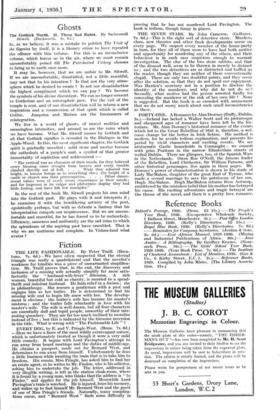Ghosts
The Gothick North. II. These Sad Ruins. By Sacheverell Sitwell. • (Duckworth. 8s. 6d.)
IF, as we believe; it was a mistake to publish The Visit of the Gypsies by itself, it is a literary crime to have repeated the offence with this volume. For this is an inconclusive volume, which leaves us in the air, where we 'must remain unenmfOrtably poised till The Fair-haired Victory chooses to bring us to earth once more.
It may .be, however, that we are unfair to Mr. Sitwell. If we are uncomfortable, dissatisfied, not a little resentful, may not that be his intention ? Is that not the very atmo- sphere which he desired to .create ? Is not our dissatisfaction the highest compliment -which we can pay ? We become the symbols of his divine discontent. We can no longer consent to Corderism and an autotaphric past. For the veil of the temple is rent, and of our dissatisfaction vill be reborn a new inspiration and a resurrection of that spirit which is called Gothic. Joaquina and Miriam are the forerunners of reintegration.
We live in a world of ghosts, of unreal realities and meaningless intensities, and around us are the ruins which we have become. What Mr. Sitwell means by Gothick and all that Gothick signifies is revealed in the Dialogue in the Apple-Wood. In this, the most significant chapter, the Gothick spirit is gradually unveiled : solid stone and mortar become the cathedrals. of a people's soul, a symbol of that greater immortality of aspiration and achievement
:- "The vertical was an obsession of their minds, for they believed every blessing came straight from heaven and every, trouble climbed directly out of hell. . . . What they admired was height, in human beings as in everything else ; the height of a castle- or church was their preoccupation. . . . Other dimen- sional values wero of much minor importance in their minds ; and for largeness in its vulgar and plutocratic display they had little fooling, and have left fow examples."
In the rest of the book Mr. Sitwell projects his own mind into the Gothick past. He plays with it and interprets it ; he examines it with the bewildering artistry of the poet, egoistically perhaps, but with so delicate a fantasy that his interpretation compels our acquiescence. But we are uncom- fortable and resentful, for he has forced us to be melancholy. Efficiency, sameness'and uniformity are the sad ruins to which the splendours of the aspiring past have crumbled. That is why we are mutinous and complain. In Vishnu-land what avatar ?










































 Previous page
Previous page